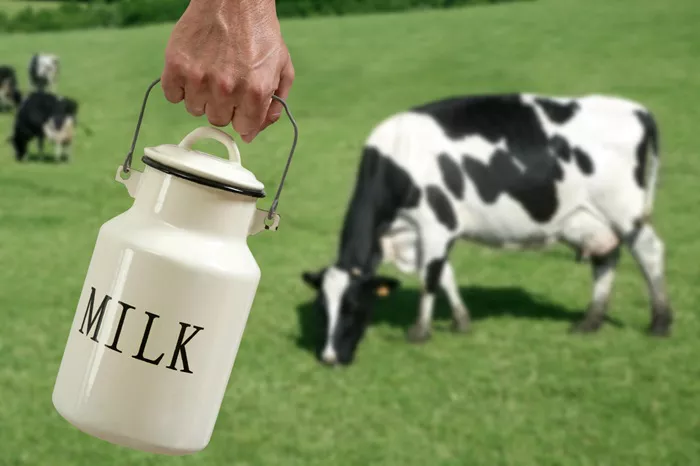The nutritional journey of a 10-month-old baby is a crucial phase. Parents often find themselves faced with various questions about what is appropriate and safe for their little ones to consume. One such common query is whether a 10-month-old can drink cow’s milk. This article aims to provide a detailed and informed perspective on this topic, considering the multiple aspects of a baby’s development and nutritional requirements.
Nutritional Composition: Cow’s Milk vs. Infant Needs
1. Protein Content
Cow’s milk has a significantly different protein composition compared to breast milk or infant formula. It contains a higher proportion of casein, a type of protein that forms a tougher curd in the stomach. For a 10-month-old with a still-developing digestive system, this can be challenging to break down. In contrast, breast milk has a more easily digestible protein profile that is better suited to the baby’s immature gut.
2. Fat and Carbohydrate Profile
The fats and carbohydrates in cow’s milk also vary. Breast milk has a unique blend of fatty acids that are essential for brain development, which is still rapid at 10 months. Cow’s milk fats may not provide the same optimal support. Additionally, the carbohydrate in cow’s milk is mainly lactose, and while infants can digest lactose, the balance and type of sugars in breast milk are more attuned to the baby’s needs.
3. Mineral Composition
Cow’s milk contains higher levels of calcium and phosphorus. While calcium is important for bone growth, the ratio of these minerals in cow’s milk may not be ideal for a 10-month-old. Their kidneys are not fully developed, and excessive intake of these minerals can put a strain on the renal system, potentially leading to issues such as kidney stones or dehydration.
Digestive System Maturity of 10-Month-Olds
1. Enzyme Production
At 10 months, a baby’s digestive enzymes are still maturing. The enzymes required to break down the complex proteins and fats in cow’s milk, like lipase and protease, are not as abundant or efficient as in an older child or adult. This means that when cow’s milk is introduced, it may not be properly digested, leading to symptoms such as abdominal pain, bloating, and diarrhea.
2. Gut Barrier Function
The gut lining of a 10-month-old is also still developing. It may be more permeable than that of an older individual, which can increase the risk of undigested proteins from cow’s milk passing through and triggering an allergic reaction. Allergies can present as skin rashes, eczema, or even more severe respiratory symptoms in some cases.
Iron Absorption and Cow’s Milk
1. Iron in Cow’s Milk
Cow’s milk is a poor source of iron. At 10 months, a baby is still building up their iron stores, which are crucial for cognitive and physical development. Breast milk and infant formula are fortified with iron to meet these needs.
2. Effect on Iron Absorption
Not only does cow’s milk lack iron, but it can also interfere with the absorption of iron from other sources. When a baby drinks cow’s milk, it can reduce the amount of iron that their body can take in from foods like fortified cereals or pureed meats. This can lead to iron deficiency anemia, which can have long-term negative impacts on a baby’s growth, learning abilities, and overall health. Symptoms of iron deficiency anemia include pale skin, lethargy, and a weakened immune system.
Alternative Milk Options for 10-Month-Olds
1. Fortified Soy Milk
Fortified soy milk can be a consideration for some babies. It is often fortified with vitamins and minerals like calcium, vitamin D, and iron to mimic the nutritional profile of breast milk or formula. However, it is important to note that soy allergies are not uncommon, and parents should introduce it gradually and watch for any signs of an allergic reaction, such as swelling, vomiting, or hives.
2. Hydrolyzed Protein Formulas
These formulas are designed for babies with sensitive stomachs or a higher risk of allergies. The proteins in hydrolyzed formulas have been broken down into smaller fragments, making them easier to digest. They can be a good alternative when breast milk is not available and cow’s milk is not suitable.
When Can Cow’s Milk Be Introduced?
1. The 12-Month Mark
The general consensus among pediatricians and child health experts is to wait until a baby is at least 12 months old before introducing cow’s milk. By this time, the baby’s digestive system has matured further, and they are better able to handle the components of cow’s milk. Their kidneys are more developed, and their ability to digest proteins and fats has improved.
2. Moderation and a Balanced Diet
Even at 12 months, cow’s milk should not replace breast milk or formula entirely. It should be given in moderation, usually around 2 to 3 cups per day. A balanced diet that includes a variety of fruits, vegetables, whole grains, and proteins from sources like meats, fish, and legumes should still be the mainstay of the baby’s nutrition. This ensures that the baby gets all the necessary nutrients for their continued growth and development.
Conclusion
In summary, it is not advisable for 10-month-old babies to drink cow’s milk. Their developing digestive systems, specific nutritional needs, and the potential risks associated with cow’s milk consumption, such as digestive issues, allergies, and iron deficiency, all point to the importance of sticking with breast milk or formula at this stage. Parents should be patient and wait until their baby reaches 12 months of age before considering the introduction of cow’s milk. As always, it is essential to consult with a pediatrician or a qualified healthcare provider before making any significant changes to a baby’s diet. By following these guidelines, parents can help ensure that their baby’s nutritional journey is on a healthy and safe path, setting the foundation for a lifetime of good health.
Related Topics:


